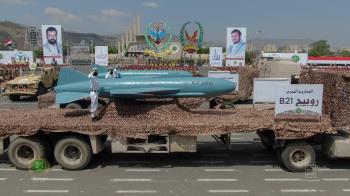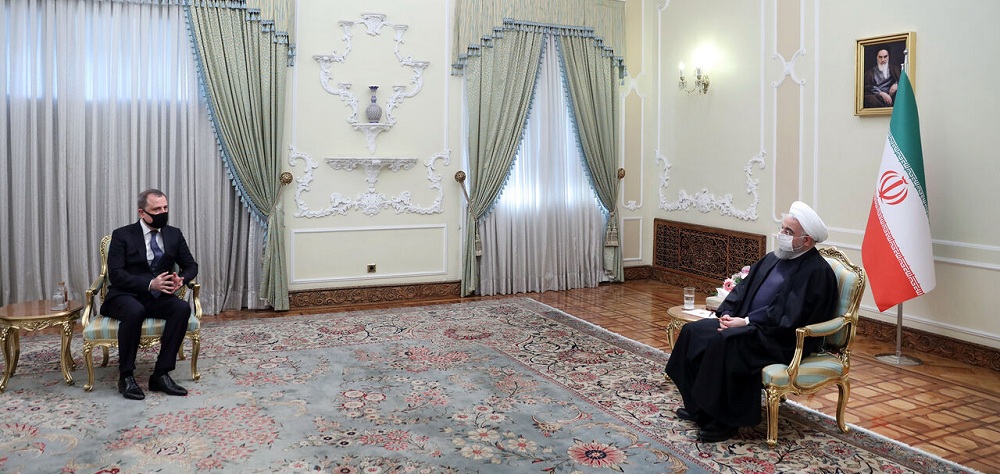Alwaght- Azerbaijan’s Foreign Minister Jeyhun Bayramov visited Iran on Wednesday to discuss with senior Iranian officials the regional and international developments. The visit is important as it follows the recent conflict between Azerbaijan and its neighbor Armenia over Karabakh disputed region and also it is Bayramov’s first trip to Tehran since he was appointed to the post in July.
During the Karabakh crisis, Iran adopted a policy of neutrality, insisted that the dispute has no military solution, and highlighted the need for two sides to go to the negotiating table and avoid hurting the civilians and each other’s economic infrastructure. Tehran called for consideration of a United Nations Security Council resolution that asks for respect to the Azerbaijani territorial integrity.
In the recent confrontation, Azerbaijani officials appreciated the Islamic Republic’s position and voiced contentment with the Iranian prevention of arms delivery to the warring sides through its territory. So, one of the goals of Bayramov’s visit to Tehran is to pass to Iran a message of the friendship of the Azerbaijani government and nation.
Meeting the Supreme National Security Council’s chief Ali Shamkhani, Bayramov thanked Iran for its “principal” policy concerning the Karabakh crisis and appreciated the position of the Iranian Leader Seyed Ali Khamenei who advocated the end of the occupation of Azerbaijani territory and the crisis.
From another aspect, the recent Karabakh war, which led to the Azerbaijan army capturing significant parts of the disputed region constituted an important geopolitical development in the South Caucasus region that can influence Iran-Azerbaijan relations. Therefore, beating the challenges via listening to the Islamic Republic’s stances and addressing its possible concerns are other objectives behind the trip.
Addressing Iran’s security concerns
One of the most sensitive issues to Iran and dangerous to the region is the Israeli regime’s efforts to get a toehold in the region and specifically along the Iranian borders through fueling the crisis in South Caucasus.
In the past two months, as the conflict unfolded the Israelis sought to seize the opportunity provided by the critical conditions in the region to play a role by sending arms to Azerbaijan in a bid to get a foothold in the strategically-important region. Certainly, this is not an issue Tehran can show the least patience with. The Israelis tried to paint as large-scale their role in Karabakh clashes to create a gap in the friendly and historical relationship between Iran and Azerbaijan.
Ahead of Bayramov’s visit to Tehran, sources had talked about discussions between the Azerbaijani FM and his Israeli counterpart that sent negative signals in the face of optimism about the success of the Tehran visit.
Elaborating on the evil actions of the hawkish and terrorist Washington-Tel Aviv-ISIS triangle, Shamkhani told Bayramov that the presence of the three allies in any part of the world especially in West Asia was detrimental and their absence was a source of peace and stability. Good neighborliness and partnership should empower the regional states to prevent the emergence of new destabilizing and crisis-making centers in the region, Shamkhani added.
Meanwhile, one of the major centers creating crisis in the region is the terrorist groups created and nurtured by the West, Israeli regime, and reactionary Arab regimes. During the recent war, reports said terrorist fighters from Syria and other countries were deployed to Azerbaijan to fight alongside Baku. Strong were the Iranian military and political officials’ reactions and the demands for them to be removed from the contentious region.
Trade cooperation boost
Aside from security, another goal driving the trip to Tehran is business ties. The recent war inflicted heavy damages on the infrastructures in the clash spots. With its potentials substantial, Iran is interested to rebuild the region’s economy by joining reconstruction projects.
In embargo condition, Iran prioritizes trade ties with neighbors and regional states in its foreign trade as a remedial tactic. In recent years, Iran became a significant trade partner to Azerbaijan, exporting to it crops, petrochemicals, plastics, dates, and many other products. Under work between them are joint economic projects like the South-North Corridor and joint border industrial park in Bileh Savar town of Iran, as well as the under-construction Khoda Afarin and Qiz Qalasi dams to produce power.



























